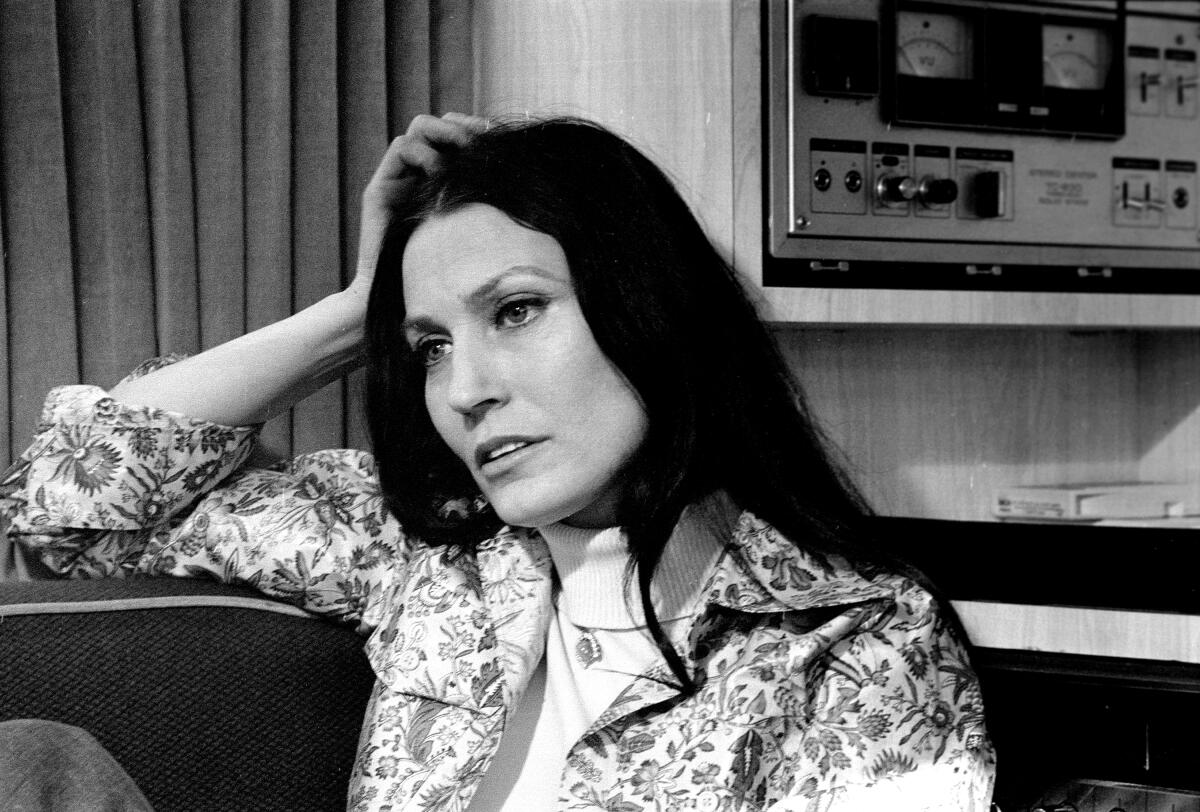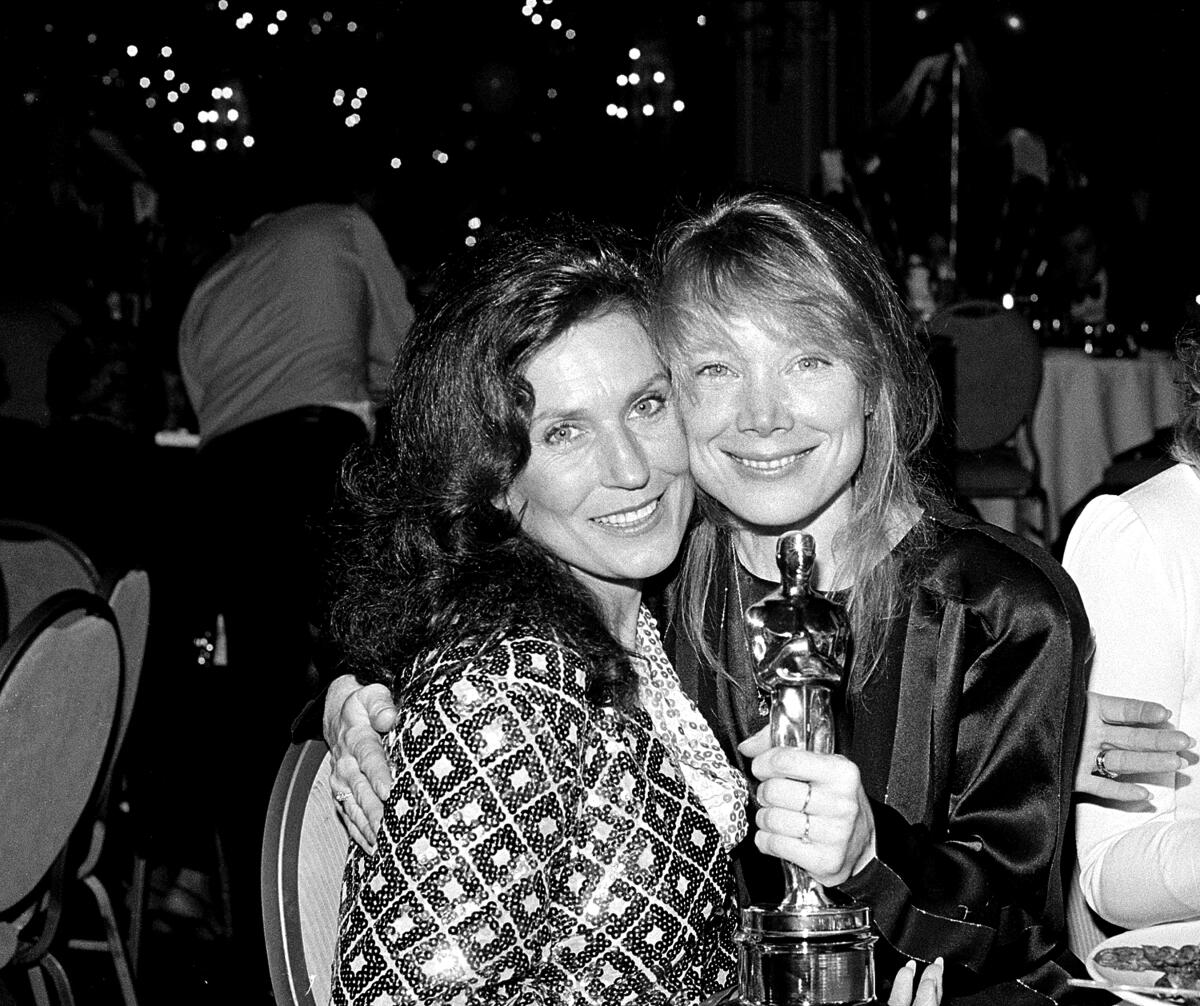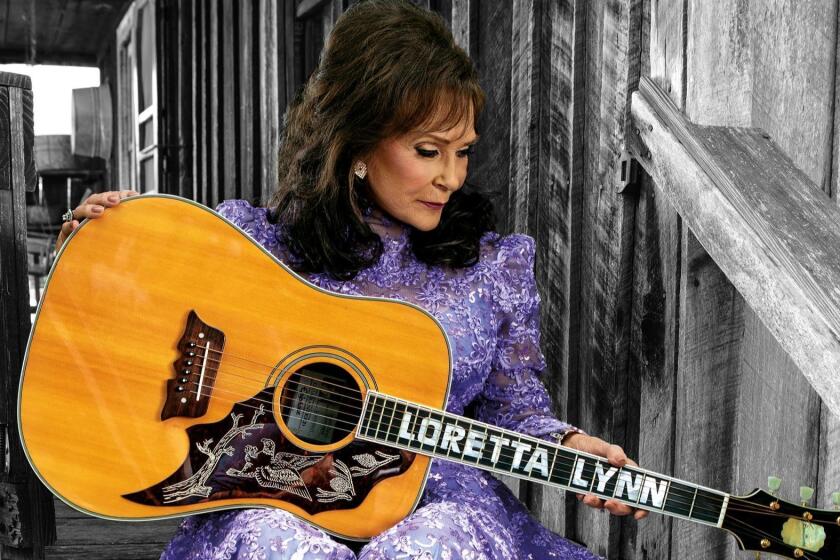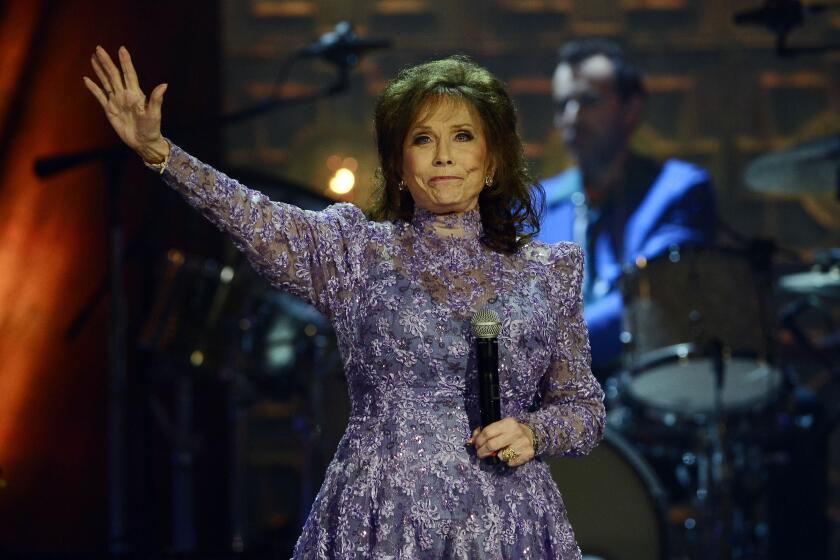In Loretta Lynn’s voice, the unflinching truth about love, motherhood and women’s lives

- Share via
Loretta Lynn had a voice made for telling the truth.
High and flinty, with a bone-deep coal-country drawl that refused to fade even as she ascended to a queenly position in the Nashville star system, her singing sliced through polished arrangements like a sharpened blade. It could embody both the pain of betrayal and the thirst for revenge; it carried a longing for the comforts of home at the same time that it imagined ways to improve on the old days. And though she easily navigated tricky melodies — spare a thought for the countless karaoke DJs who’ve endured the mistreatment of “Louisiana Woman, Mississippi Man” — her delivery was always straightforward: Here’s what happened, and don’t blame me if you can’t handle it. If Lynn, who died Tuesday at age 90, ever learned to soft-pedal an emotion, she never revealed it onstage or in the studio.
Indeed, honesty — about love, about motherhood, about the nature of women’s lives in an era of shifting mores — was perhaps the defining quality of Lynn’s half-century-long career as a country singer and songwriter eager to illuminate experiences too often hidden from view.
Loretta Lynn was arguably the most important female figure in postwar country music as her music challenged the norm of domestic life in rural America.
She pushed back against a husband’s territorialism in “Don’t Come Home A-Drinkin’ (With Lovin’ on Your Mind),” a No. 1 hit — her first of 16 — in 1967. She described the sexual freedom afforded by widely available birth control in “The Pill” and, not coincidentally, the stigma faced by divorced women in the mid-’70s in “Rated X.” Her signature song, “Coal Miner’s Daughter,” rendered her rural upbringing in starkly unembarrassed language — then led to a bestselling memoir and a Hollywood film adaptation starring Sissy Spacek in the Oscar-winning title role.

The forthrightness of Lynn’s music turned a tale of would-be subjugation — married at 15, a mother by 16, ritually cheated on by the spouse who also acted as her manager — into one of female empowerment. Today we’d say she was taking control of her narrative, radically reframing its pressures and indignities to center her lived experience instead of those of the men around her.
She also found dark humor in the details of a patriarchal society: Songs like “You Ain’t Woman Enough (to Take My Man)” and “Fist City” threatened violence against the women competing with her for a man’s attention. Yet in each you can hear Lynn’s scorn for a system that props up dummies — “Not saying my baby’s a saint / ’Cause he ain’t,” she sings in “Fist City” — as prized jewels to be fought over.
Lynn’s success expanded a previously male-dominated country-music business — in 1972 she became the first woman to be named entertainer of the year by the Country Music Assn. — but it also helped bring country music into pop-cultural spaces that hadn’t necessarily welcomed Nashville’s finest. Lynn seemed to be everywhere in the late ’70s and early ’80s: performing with the Muppets, singing at President Carter’s inauguration, duetting on TV with Frank Sinatra. The “Coal Miner’s Daughter” movie pushed her further into the mainstream but didn’t do a thing to diminish her what-you-see-is-what-you-get.
“I love running barefooted through the old cornfields, and I love that country ham,” she famously sang in “You’re Lookin’ at Country,” and there’s simply nothing to do but stan a songwriter who uses a word as down-home as “ham” in her work.

Lynn’s once-bustling recording career began to slow down in the ’90s, just as a new generation of female country stars like Shania Twain and the Dixie Chicks were carrying on her happy embrace of taboo subject matter. But she made a high-profile comeback in 2004 with “Van Lear Rose,” an album she recorded with Jack White of the White Stripes, and she stayed on the road pretty consistently into her 80s, even if she didn’t always seem psyched to be there. I vividly remember a gig in the late 2000s where she kept handing off vocal duties to one of her bandmates while she sat on an ornate throne.
“Miss Loretta, I think the audience might like to hear you sing one,” the guy told her, which I suppose was true enough, though I for one was just as gratified by watching her not do something she didn’t want to do.
LeAnn Rimes, Mickey Guyton, Kacey Musgraves and Dolly Parton are among the many country music stars paying tribute to Loretta Lynn, who died Tuesday.
In 2016 Lynn released the first installment in a series of recordings she made with her daughter Patsy Lynn Russell and with Johnny Cash’s son, John Carter Cash — intimately arranged collections of oldies and new tunes not unlike those Johnny Cash made near the end of his life with the producer Rick Rubin. And signs of her influence only continued to crop up in music by the likes of Miranda Lambert, who thanked Lynn on Twitter on Tuesday for having “blazed so many trails for all of us girls in country music,” and Brandi Carlile, who debuted her Highwomen supergroup during a tribute concert to Lynn in Nashville in 2019. (Her impact stretched beyond country music too: A couple of years ago, Vampire Weekend’s Ezra Koenig, of all people, told me he’d styled his and Danielle Haim’s duets on VW’s latest album after Lynn and Conway Twitty’s late-’70s “You’re the Reason Our Kids Are Ugly.”)
As these people could tell you, the reason Lynn’s music still makes sense all these years later — the reason you can put on her first single, “I’m a Honky Tonk Girl,” and still get a little jolt from her pure, pleading vocals — is because there’s nothing phony in it. It was true then; it’s true now; it’ll be true tomorrow.
More to Read
The biggest entertainment stories
Get our big stories about Hollywood, film, television, music, arts, culture and more right in your inbox as soon as they publish.
You may occasionally receive promotional content from the Los Angeles Times.












